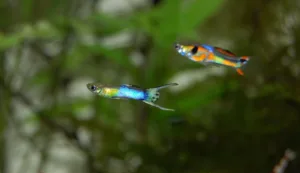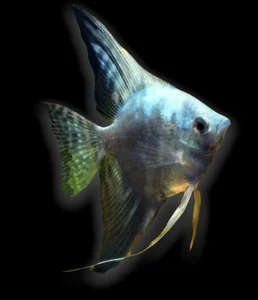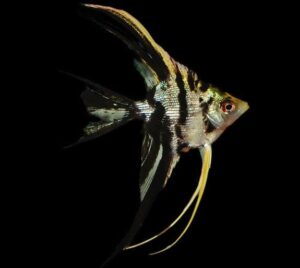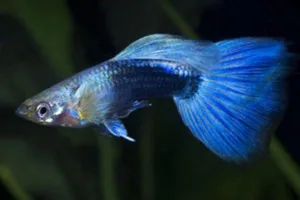The best guppy fish tank filter for your tank are the ones that keep your water crystal clear. Maintaining a clean and healthy environment for your fish is one of the most important parts of fish keeping. One of the key components in achieving this is selecting the right filter for your guppy fish tank. Filters play a vital role in keeping the water quality optimal by removing debris, toxins, and providing essential biological filtration. In this comprehensive guide, we’ll explore the various types of filters available, including sponge filters, hang-on-back filters, and canister filters, and delve into the essential components and considerations for your guppy fish tank filtration system.
Types of Guppy Fish Tank Filter
Sponge Filter
Sponge filters are a popular choice among guppy fish keepers for several reasons. They are known for being gentle on guppies and their fry, making them an excellent choice for breeding tanks. Sponge filters provide effective biological filtration, promoting the growth of beneficial bacteria that help break down ammonia and nitrites. This makes them a superb choice for best guppy fish tank filter guppy tanks with delicate ecosystems.
Hang-on-Back Filter (HOB)
Another widely used option for guppy fish tanks is the hang-on-back filter (HOB). These filters are known for their ease of setup and maintenance, making them a top choice for beginners. HOB filters offer a well-rounded filtration approach, incorporating mechanical, biological, and chemical filtration. This versatility ensures that your guppy tank remains clean and safe for your fish and is a great choice for best guppy fish tank filter.
Canister Filter
For larger guppy fish tanks, especially those with higher fish populations, canister filters are the best the go-to choice. They are known for their exceptional filtration capabilities, providing excellent mechanical, biological, and chemical filtration. However, it’s important to note that canister filters can be more expensive and require a bit more expertise to set up and maintain compared to sponge filters or HOB filters but they are one of the best choices for best guppy fish tank filter.
| Filter Type | Pros | Cons |
|---|---|---|
| Sponge Filter | – Gentle filtration, ideal for guppies and fry | – Limited mechanical filtration |
| – Excellent biological filtration | – May require an air pump and tubing | |
| – Oxygenates the water | – Less suitable for larger tanks | |
| – Easy maintenance | – May not be aesthetically pleasing | |
| – Cost-effective | ||
| Hang-on-Back Filter | – Easy setup and maintenance | – Limited mechanical filtration |
| (HOB) | – Combines mechanical, biological, and chemical | – Visible, not ideal for aquascaping |
| filtration in one unit | – Flow rate may not be adjustable | |
| – Adjustable flow rate | – Noise level can be an issue in some models | |
| – Suitable for a wide range of tank sizes | ||
| Canister Filter | – Superior filtration with mechanical, biological, | – Complex setup and maintenance |
| and chemical components | – Higher initial cost and ongoing expenses | |
| – High flow rates for efficient water circulation | – Takes up external space outside the tank | |
| – Customizable filter media configurations | – May require technical expertise | |
| – Minimal intrusion into the tank’s interior | – Noise level can vary depending on the model | |
| – Suitable for larger tanks and high bioloads |
Sponge Filters for Guppy Fish Tanks – Gentle Filtration

Sponge filters are a popular choice among guppy fish tank filter for their gentle yet effective filtration capabilities. In this section, we’ll delve deeper into sponge filters, exploring their pros and cons, and even highlighting a few trusted brand names in the market.
Pros of Sponge Filters
1. Gentle Filtration
One of the standout advantages of guppy fish tank filter sponge filters is their gentle filtration. They are ideal for guppy fish tanks, particularly those containing fry or delicate species. The sponge acts as a buffer, preventing young or small fish from being drawn into the filter, which can happen with more powerful filters.
2. Biological Filtration
Sponge filters excel in providing biological filtration. The porous structure of the sponge provides ample surface area for beneficial bacteria to thrive. These bacteria play a crucial role in breaking down harmful ammonia and nitrites, ensuring a healthy and stable environment for your guppies.
3. Oxygenation
Sponge filters are known for their oxygenation benefits. As air is drawn through the sponge, it creates a gentle current, increasing oxygen levels in the tank. This is particularly beneficial for guppy fish, as they thrive in well-oxygenated water.
4. Easy Maintenance
Maintenance of sponge filters is straightforward. They are easy to clean, usually requiring a simple rinse of the sponge in dechlorinated water. This ease of maintenance makes them an excellent choice for beginners or those who prefer hassle-free filtration.
5. Cost-Effective
Compared to some other filter types, sponge filters are budget-friendly. Their initial cost is relatively low, and there are no ongoing expenses for filter cartridges or replacement parts. This affordability makes them accessible to a wide range of fish keepers.
Cons of Sponge Filters
1. Limited Mechanical Filtration
While sponge filters are proficient at biological filtration, they offer limited mechanical filtration. They may not effectively remove fine particles and debris from the water. To address this, you can pair a sponge filter with a simple sponge pre-filter or a sponge intake cover to trap larger debris.
2. Lower Flow Rate
Sponge filters typically have a lower flow rate compared to hang-on-back or canister filters. This can be a disadvantage in larger tanks or in situations where stronger water circulation is necessary.
3. Aesthetic Considerations
Some aquarists may find sponge filters less aesthetically pleasing compared to other filter types, such as canister filters, which can be discreetly hidden in the tank’s cabinet. However, this is a subjective consideration and can be addressed by creatively arranging decorations or plants to conceal the sponge filter.
Trusted Brands for Sponge Filters
If you’re considering a sponge filter for your guppy fish tank, here are a few trusted brand names to look out for:
- Sponge Filters by ATI Sponge Filters: ATI is known for producing high-quality sponge filters that come in various sizes to suit different tank capacities. Their filters are durable and offer excellent biological filtration.
- Hydor Professional Sponge Filters: Hydor offers a range of sponge filters that are reliable and efficient. They are known for their quiet operation and easy maintenance.
- Aquaneat Sponge Filters: Aquaneat sponge filters are affordable and come in various sizes. They are a popular choice for smaller guppy tanks and breeding setups.
- Fluval Edge Pre-Filter Sponge: If you’re using a hang-on-back filter and want to convert it into a sponge filter, Fluval offers pre-filter sponges that can be attached to the filter intake. This adds sponge filtration to your existing setup.
Sponge filters can be a great choice for guppy fish tanks, especially when gentler filtration and biological stability are essential. Their pros, including gentle filtration, biological benefits, and ease of maintenance, outweigh their cons. By selecting a trusted brand and pairing a sponge filter with appropriate mechanical filtration solutions, you can create a thriving and healthy environment for your guppies. When I have used sponge filters in my tank I have seen cleaner and better quality water every time.
Hang-on-Back Filters for Guppy Fish Tanks – Most versatile option

Hang-on-back (HOB) filters are another popular choice among guppy fish keepers due to their versatility and ease of use. In this section, we’ll take a closer look at HOB filters, exploring their pros and cons, and highlighting some reputable brand names in the market.
Pros of Hang-on-Back Filters
1. Ease of Setup
One of the most significant advantages of HOB filters is their simplicity and ease of setup. They typically come with all the necessary components, making them an excellent choice for beginners. You can attach them to the back of your tank, and they’re ready to go with minimal effort.
2. Mechanical, Biological, and Chemical Filtration
Hang-on-back filters provide a well-rounded approach to filtration, incorporating mechanical, biological, and chemical filtration in one compact unit. The mechanical filter media efficiently removes debris and particles from the water, while the biological filter media hosts beneficial bacteria for ammonia and nitrite breakdown. Some HOB filters also include space for chemical filter media to remove impurities and excess nutrients.
3. Adjustable Flow Rate
Many HOB filters offer adjustable flow rates, allowing you to customize the water circulation according to your guppy tank’s needs. This feature is particularly useful if you have sensitive or slow-swimming fish.
4. Space-Saving
HOB filters are designed to hang on the back of the tank, saving valuable space within the aquarium itself. This design keeps the interior of your tank uncluttered and provides more room for decorations or additional fish.
5. Easy Maintenance
Maintaining HOB filters is straightforward. Cleaning the mechanical filter media or replacing it as needed is a simple task. Regular maintenance ensures consistent filtration performance.
Cons of Hang-on-Back Filters
1. Flow Rate Limitations
While adjustable, the flow rate of HOB filters may not be sufficient for larger tanks or setups with high fish populations. In such cases, you may need to invest in multiple HOB filters or consider a more powerful filtration system.
2. Noise Level
Some HOB filters can generate noise, particularly if the water level in the tank drops too low, causing a splashing sound. Regularly topping off your tank can help mitigate this issue. Additionally, choosing a quieter HOB filter model can reduce noise concerns.
3. Limited Space for Media
The space available for filter media in HOB filters is limited compared to canister filters. This means you may need to replace or clean the media more frequently, especially in tanks with high bioloads.
Trusted Brands for Hang-on-Back Filters
If you’re considering a hang-on-back filter for your guppy fish tank, here are some reputable brand names to consider:
- Aqueon QuietFlow Hang-On-Back Filter: Aqueon is known for its reliable and quiet HOB filters. Their QuietFlow series offers various sizes suitable for different tank capacities, and they provide efficient filtration.
- Marineland Penguin Power Filter: Marineland’s Penguin Power Filters are a popular choice among aquarists. They offer mechanical, biological, and chemical filtration and are known for their durability.
- Fluval C Series Power Filters: Fluval’s C Series Power Filters provide excellent filtration and are known for their quiet operation. They also offer adjustable flow rates to suit your tank’s needs.
- Seachem Tidal Power Filters: Seachem’s Tidal Power Filters are known for their innovative design, including a self-priming feature and adjustable flow rate. They provide effective filtration and ease of maintenance.
Hang-on-back filters are versatile and user-friendly filtration solutions for guppy fish tanks. Their ease of setup, all-in-one filtration capabilities, and space-saving design make them a popular choice among both beginners and experienced aquarists. Consider your tank size, fish population, and maintenance preferences when selecting the right HOB filter for your guppy tank, and you’ll be well on your way to maintaining a clean and healthy aquatic environment for your guppies. Stay tuned for more expert advice on guppy fish care!
Canister Filters for Guppy Fish Tanks

Canister filters are the heavyweight champions of the aquarium filtration world, known for their exceptional filtration capabilities. In this section, we’ll dive deep into canister filters, exploring their pros and cons, and mentioning some reputable brand names to consider.
Pros of Canister Filters
1. Superior Filtration
Canister filters are renowned for their outstanding filtration performance. They offer a trifecta of mechanical, biological, and chemical filtration, ensuring pristine water quality in your guppy fish tank filter. The larger filter media capacity allows for thorough filtration, making them ideal for larger tanks and high bioload setups.
2. High Flow Rates
Canister filters typically have powerful pumps that generate high flow rates, ensuring efficient water circulation throughout the tank. This is beneficial for maintaining consistent water quality and preventing dead spots where debris and waste can accumulate.
3. Customizable Media
Canister filters provide ample space for customizable filter media configurations. You can choose the specific media types and arrangements that best suit your tank’s needs. This versatility allows you to target specific filtration goals, whether it’s removing particles, promoting biological activity, or addressing chemical imbalances.
4. Minimal Intrusion
Canister filters are located outside the tank, which means they don’t take up valuable space within the aquarium. This unobtrusive placement allows for more freedom in designing your tank’s interior and adding decorations or plants.
5. Quiet Operation
Many modern canister filters are designed for quiet operation. They incorporate features such as noise-dampening materials and efficient impellers to minimize sound, ensuring a peaceful environment for both you and your guppies.
Cons of Canister Filters
1. Complexity
One of the primary drawbacks of canister filters is their complexity, especially for beginners. Setting up and maintaining a canister filter may require more effort and technical know-how compared to other filtration systems. Proper installation and routine maintenance are crucial to avoid issues.
2. Higher Cost
Canister filters are typically more expensive than sponge filters or hang-on-back filters. The initial investment includes not only the filter itself but also additional filter media. Additionally, ongoing expenses may include replacement parts and filter media.
3. Maintenance Challenges
Cleaning a canister filter can be a bit more involved compared to other filter types. You need to disconnect the canister, open it, clean or replace the filter media, and then reassemble it. This process can be time-consuming and may require some experience.
Trusted Brands for Canister Filters
When considering a canister filter for your guppy fish tank, it’s essential to invest in a reputable brand to ensure reliability and performance. Here are some trusted brand names to consider:
- Fluval Canister Filters: Fluval is a well-respected brand known for its range of high-quality canister filters. The Fluval FX series, in particular, offers exceptional filtration capacity and features for larger tanks.
- Eheim Classic Canister Filters: Eheim has a long-standing reputation for producing reliable and efficient canister filters. The Eheim Classic series is known for its durability and ease of maintenance.
- SunSun Canister Filters: SunSun offers budget-friendly canister filters that provide good filtration performance. They are a popular choice for aquarists looking for a cost-effective option.
- Penn Plax Cascade Canister Filters: Penn Plax Cascade canister filters are known for their affordability and functionality. They offer a range of sizes to accommodate different tank capacities.
Canister filters are the go-to choice for larger guppy fish tanks and setups with high bioloads. Their superior filtration capabilities and customization options make them an excellent choice for experienced aquarists. However, their complexity, higher cost, and maintenance requirements may not be suitable for beginners or smaller tanks. Consider your tank size, budget, and maintenance capabilities when deciding whether a canister filter is the right choice for your guppy fish tank. With proper setup and maintenance, a canister filter can provide top-notch filtration and help maintain a healthy aquatic environment for your guppies. Stay tuned for more expert advice on guppy fish care!
How to Choose the Right Filter for Your Guppy Fish Tank

Selecting the right filter for your guppy fish tank is a crucial decision that directly impacts the health and well-being of your fish. Here’s a comprehensive guide on how to make the best choice, taking into consideration various factors to ensure your guppies thrive.
1. Tank Size
The size of your guppy fish tank is one of the most critical factors in filter selection. It determines the volume of water that needs to be filtered and, consequently, the filter’s required capacity. Here’s a general guideline:
- For small tanks (under 10 gallons): Sponge filters or small hang-on-back (HOB) filters are usually sufficient. These tanks often house a limited number of guppies, and gentle filtration is preferred.
- For medium-sized tanks (10 to 50 gallons): HOB filters or canister filters can be suitable, depending on the fish population. HOB filters offer versatility and are often preferred for tanks of this size. Canister filters are ideal for setups with larger populations or higher bioloads.
- For large tanks (50 gallons and above): Canister filters are typically the best choice. These tanks require robust filtration to maintain water quality, and canister filters provide the necessary capacity.
2. Fish Population
Consider the number of guppies in your tank. More fish mean a higher bioload, which increases the need for efficient filtration. If you have a large number of guppies, you may want to opt for a more powerful filter or even multiple filters to ensure optimal water quality.
3. Biological Needs
Evaluate the specific needs of your guppy tank. If you have a heavily planted tank, biological filtration becomes paramount. Plants can consume some of the waste produced by fish, but you’ll still need a filter to ensure the overall health of your tank. In this case, filters that promote beneficial bacterial growth, such as sponge filters and canister filters, are excellent choices.
4. Ease of Maintenance
Consider your level of expertise and the time you can dedicate to filter maintenance. Different filters require varying levels of care:
- Sponge filters are the easiest to maintain, typically requiring a simple rinse of the sponge in dechlorinated water.
- HOB filters are relatively easy to maintain, with filter media that can be cleaned or replaced as needed.
- Canister filters, while highly effective, can be more complex to clean and maintain. They involve disconnecting the canister, opening it, cleaning or replacing the media, and reassembling it.
Choose a filter that aligns with your comfort level and availability for maintenance tasks.
5. Budget
Your budget is another essential consideration. Canister filters are generally more expensive than sponge filters or HOB filters. In addition to the initial purchase, factor in ongoing costs for replacement parts and filter media. Ensure that your budget can accommodate these expenses before making your final decision.
6. Aesthetic Considerations
Consider how the filter will fit into the overall aesthetics of your tank. While this may be a less critical factor, some aquarists prefer filters that are discreetly hidden or aesthetically pleasing. HOB filters are typically more visible, while canister filters can be placed out of sight in a tank cabinet.
7. Noise Level
Some filters may produce more noise than others. Research the noise levels associated with the filter models you’re considering, especially if the tank is in a quiet area of your home.
8. Adjustable Flow Rate
If you have sensitive or slow-swimming fish like guppies, filters with adjustable flow rates can be beneficial. These allow you to customize the water circulation to suit your fish’s needs.
9. Brand and Model Selection
Once you’ve considered all the factors above, research and select a trusted brand and model that meets your specific requirements. Refer to the previous sections on Sponge Filters, Hang-on-Back Filters, and Canister Filters for some reputable brand names to consider in each category.
Essential Components of a Guppy Fish Tank Filter
When setting up your guppy fish tank filter, it’s not just the filter itself that matters. Several key components contribute to the overall efficiency of your filtration system.
Filter Media
Filter media is the heart of any filtration system. It’s the material inside the filter through which water passes. Different types of filter media serve specific purposes. For instance, mechanical filter media traps debris and particles, preventing them from re-entering the tank. Biological filter media provides a habitat for beneficial bacteria that break down harmful ammonia and nitrites. And chemical filter media can help remove impurities and excess nutrients from the water.
Here’s a table summarizing the types of filter media and their functions:
| Type of Filter Media | Function |
|---|---|
| Mechanical | Traps debris and particles from the water |
| Biological | Hosts beneficial bacteria to break down ammonia |
| Chemical | Removes impurities and excess nutrients |
Air Pump
If you’ve opted for a sponge filter, you’ll need an air pump to power it. Sponge filters operate by drawing water through the sponge with the help of air bubbles. The air pump creates these bubbles, ensuring proper circulation and filtration.
Airline Tubing
Airline tubing is essential for connecting the air pump to the sponge filter. It acts as the conduit through which air travels, creating the necessary flow for the sponge filter to operate effectively.
Check Valve
A check valve is a small but crucial component of your guppy fish tank setup. It prevents water from flowing back into the air pump if the power goes out. This simple device can save your filtration system from potential damage and ensure continuous operation.
In the world of aquariums, selecting the best filter for your guppy fish tank is undoubtedly a important decision. A well-chosen guppy fish tank filter ensures that your aquatic companions thrive in a clean and healthy environment. As we’ve explored the various options, including canister filters, hang-on-back filters, and even sponge filters, it’s evident that there is a plethora of choices to cater to every aquarist’s unique needs.
Whether you’re looking for mechanical filtration to trap debris and particles, biological filtration to nurture beneficial bacteria, or chemical filtration to maintain water quality, the world of aquarium filter technology has a solution for you. From freshwater filters to saltwater filters, from internal filters that remain discreet within your tank to external filters that free up space, the options are abundant.
But the journey doesn’t end there. With the wide array of filter types, including undergravel filters, power filters, box filters, corner filters, mat filters, and even DIY filters or homemade filters, the choices can seem overwhelming. Finding the top-rated guppy fish tank filter involves considering factors like tank size, fish population, and maintenance preferences.
For those who value ease of setup and maintenance, hang-on-back filters offer simplicity and efficiency. If you’re seeking powerhouse filtration for larger tanks, canister filters rise to the occasion. And for those looking for gentle filtration suitable for delicate fish and fry, sponge filters present an excellent solution.
In your journey to find the best filter for a guppy fish tank, don’t forget essential components like the filter pad, filter cartridge, and filter media, which play a pivotal role in keeping your tank clean. Consider the essential supporting cast, including the air pump, airline tubing, and check valve, especially if you opt for a sponge filter or DIY filter.
As you explore guppy fish tank filter reviews and seek recommendations from experienced aquarists, remember that there’s no one-size-fits-all solution. Your choice should align with your tank’s unique requirements and your personal preferences as an aquarist.
In conclusion, whether you’re nurturing a thriving guppy community or embarking on a new aquatic adventure, the right fish filter, or water filter is your trusty companion on this journey. The world of pet filters and tank filters offers a rich tapestry of options to explore. With careful consideration and research, you’ll find the perfect filtration system to create a harmonious underwater world for your beloved guppies.










